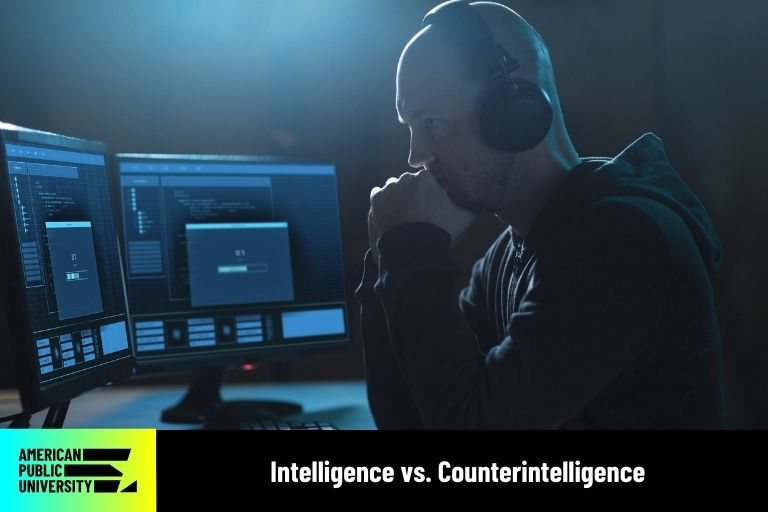09/15/2025

How Intelligence and Counterintelligence Support National Security
If you’ve ever wondered how countries protect themselves from covert threats, or how intelligence professionals work behind the scenes to keep sensitive information safe, learning the difference between intelligence and counterintelligence is a meaningful first step. Whether you’re exploring security studies, considering a future in intelligence services, or simply fascinated by espionage and data analysis, these two fields represent complementary areas that may contribute to national security efforts.
What Is Intelligence?
At its core, intelligence refers to information that agencies gather to support decision makers in government, military, or security services. The goal is to identify and understand threats to national security, whether from foreign intelligence services, hostile groups, or evolving geopolitical tensions.
Intelligence Disciplines in National Security
- Human Intelligence (HUMINT): Information from human sources and field contacts.
- Signals Intelligence (SIGINT) & Communications Intelligence (COMINT): Interception of electronic communications.
- Imagery Intelligence (IMINT): Satellite or aerial imagery.
- Open Source Intelligence (OSINT): Publicly available information, including media and social platforms.
- Signature Intelligence (SIGINT) (distinct from Signals Intelligence): Detection of enemy weapon or vehicle signatures via electromagnetic or thermal emissions.
All these disciplines contribute to intelligence services’ missions—helping analyze potential threats, observe foreign adversaries, and provide timely intelligence to support military or government actions.
What Is Counterintelligence?
While intelligence aims to collect information, counterintelligence focuses on protecting sensitive information and preventing hostile actions. This discipline tackles espionage, sabotage, and even double agents, using both defensive and offensive strategies.
Core Counterintelligence Responsibilities
- Detecting and neutralizing foreign intelligence activity.
- Safeguarding classified information from hostile security services or foreign entities.
- Conducting surveillance, investigation, and force protection.
- Creating false information that misleads adversaries (deception campaigns).
- Collaborating across agencies to secure operations and personnel from threats.
In essence, counterintelligence protects the integrity of intelligence services themselves—ensuring that espionage, sabotage, or misinformation don’t undermine national interests.
Intelligence Community Roles and Collaboration
Both intelligence and counterintelligence activities are handled by a network of intelligence agencies and security services—the intelligence community. In many cases, professionals within the intelligence community collaborate across agencies to support national security goals.
- Intelligence roles involve collecting and analyzing signals, satellite imagery, human sources, or policy trends.
- Counterintelligence roles focus on detecting espionage, protecting classified operations, and maintaining internal security.
The two fields often work hand in hand; intelligence analysts may provide insights that inform counterintelligence investigations, and vice versa. Both disciplines require strong analytical thinking, ethical awareness, cultural understanding, and collaborative communication.
Typical Career Paths in Intelligence and Counterintelligence
- Intelligence Analyst: Supports national security decisions using HUMINT, SIGINT, or OSINT to track potential threats.
- Counterintelligence Agent: Works to detect, investigate, and stop espionage or insider threats.
- Field Officer or Operations Specialist: Participates in surveillance, threat assessment, or protective operations.
- Policy Advisor or Researcher: Drafts briefs for policymakers about foreign threats or security policy.
- Cybersecurity or Digital Intelligence Specialist: Supports force protection and counterintelligence using digital tools to identify anomalies or breaches.
Understanding the fundamentals of intelligence and counterintelligence can help clarify the responsibilities, challenges, and skills associated with each career path. Whether focused on analysis, security operations, or threat prevention, these roles play a vital part in supporting national security efforts.
Ready to take the next step toward a role in national security? Learn how to become a counterintelligence agent and explore the training, skills, and pathways that can help you succeed in this dynamic field.
Essential Skills for Intelligence and Counterintelligence Careers
If you're looking to lean toward intelligence or counterintelligence, these foundational skills are the key to success:
- Critical Thinking and Analysis: Interpreting complex information from diverse sources.
- Attention to Detail: Detecting patterns, anomalies, or deceptive tactics.
- Ethical Judgment: Handling sensitive information with integrity.
- Cross-Cultural Awareness: Understanding motivations of foreign adversaries and international contexts.
- Communication: Writing clear briefings, sharing intelligence responsibly, or coordinating with other agencies.
These skills help specialists gather insights, contribute to national protection, and may contribute to operations and strategic planning in support roles within the field.
Choosing Your Track in Intelligence and Counterintelligence
Intelligence and counterintelligence are two sides of the same coin, each serving national security in distinct but interrelated ways. Intelligence gathers insights; counterintelligence protects those operations. Both disciplines require strong analytical skills, ethical decision-making, and a dedication to safeguarding the nation.
If you're passionate about how government and military operations defend against threats—or drawn to spycraft and investigation—consider exploring intelligence-related courses. These programs may help students develop strong analytical abilities, operational awareness, and strategic decision-making skills that apply in both public and private sectors.